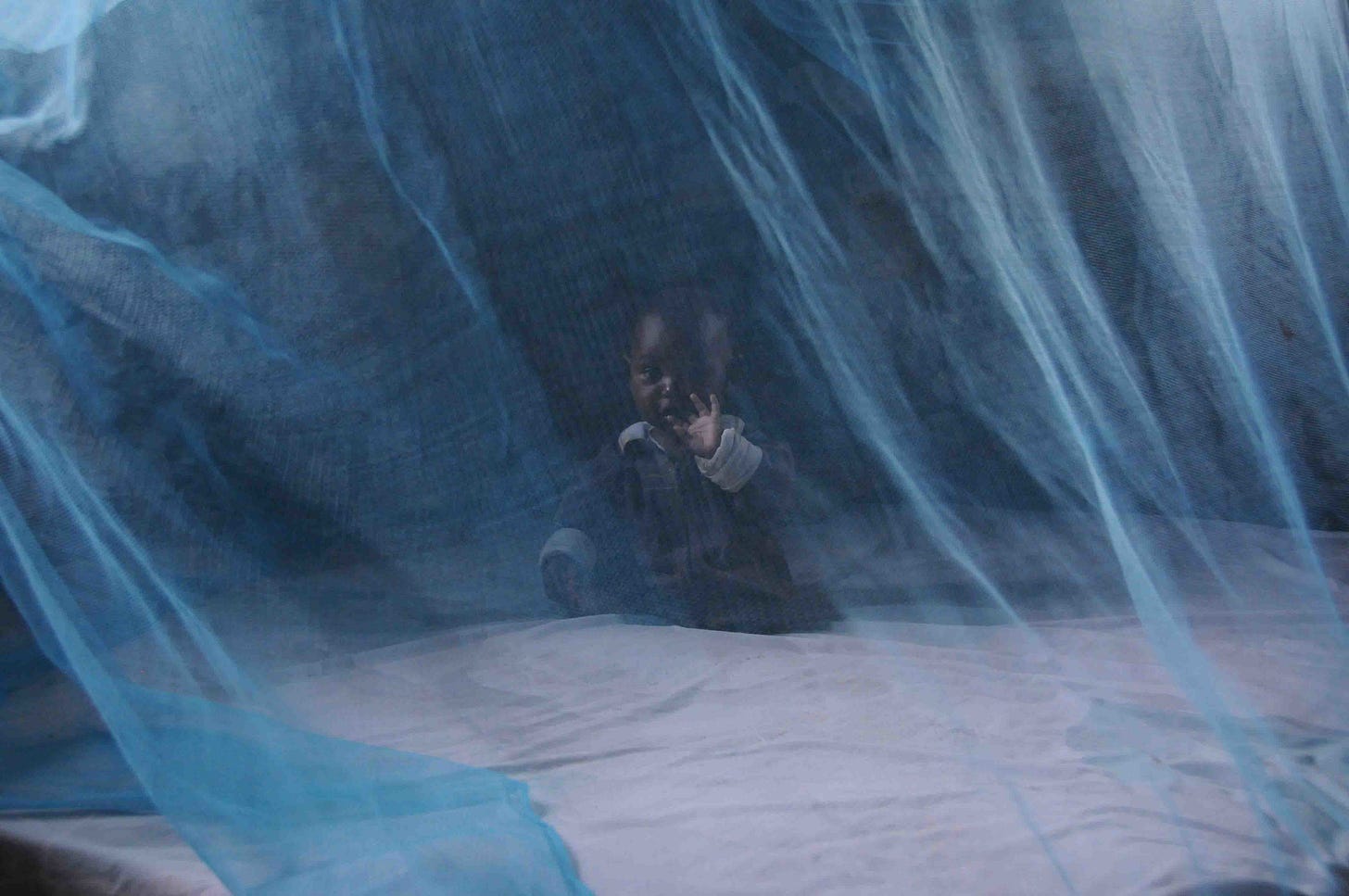The Human Faces of the USAID Shutdown
The agency’s sudden closure is a betrayal both of the hardworking civil servants who carried out its mission and the people around the world whose good it served.

I WORK IN GLOBAL DEVELOPMENT, A FIELD that has suddenly become the focus of intense political controversy—even though most Americans still don’t know the basics of what it is, how it is conducted, or why it matters.
When we talk about global development or foreign aid, here—at the risk of oversimplifying—is what we mean: the strengthening of capacities in economic development, health, education, energy, food security and safety, and governance, by means of humanitarian and technical assistance, with respect for human rights, and in ways that are congruent with the cultures and traditions of host cultures. Putting it more simply, it’s using expertise to partner with host nationals on the ground to improve individual, community, and societal well-being.
My own career in this field goes back some fifty years. I began in 1977 as a Peace Corps volunteer. I was a malaria health worker in a remote Colombian Village in the Choco, the western region bordering Panama to the north and the Pacific Ocean to the west. Through my work educating villagers about malaria, dispensing malaria medication to the sick, and studying the mosquito that transmits the disease, I learned firsthand that building relationships with people from other countries is one of the best foreign policy tools that America has.
I was posted in a remote village of approximately 140 people, two and a half days by canoe from electricity. Living and working side-by-side with my colleagues and villagers, I became the face of America—a country that cared about them and wanted to make their lives better. I’ll never forget the many nights sitting with my Colombian coworkers, in front of the wooden house-on-stilts that served as both my home and the village health center, collecting mosquitos for dissection and study. We talked about our work, but more importantly we talked about our lives and aspirations. We came to understand that we had much more in common than not, and that our hopes for our lives and loved ones were essentially similar.
After my two years in the Peace Corps, I went to grad school to get a doctorate of education. I then started working as a USAID contractor specializing in strengthening education systems around the world.
Now, you may have heard some horror stories about USAID in the last few weeks, as Elon Musk and his allies have mixed real-life tales of true USAID shortcomings with totally made-up conspiracy theories and rank lies. They have depicted USAID as the center not only of government waste but of corruption and Deep State power.
The USAID I know is not recognizable in these stories. I am not a radical lunatic or incompetent. Nor are my colleagues. We work tirelessly across sectors—providing humanitarian aid and technical assistance. We partner with host-country organizations learning from one another to strengthen education, agriculture, health, food security, and civil society. We combat disease, help stabilize war-torn communities, work with at-risk youth, teach children to read, and clean up environmental disasters, including Agent Orange.
Over the years, I’ve worked in many countries across six continents: Uganda, Malawi, Ghana, Guatemala, El Salvador, Jordan, Egypt, Afghanistan, Bosnia-Herzegovina, Macedonia, Turkmenistan, Uzbekistan, Kazakhstan, and more. One of my recent posts was a USAID-funded project in Pakistan, where I was a technical adviser employed by the International Rescue Committee, the prime contractor for the project. From 2013 to 2020, we targeted 1.1 million children, including girls, to learn to read in Urdu, Pashtu, and Sindh. Our focus was on enhancing teachers’ ability to teach reading, communities’ ability to support local schools, and the government’s ability to improve education policies and practices, such as increasing reading instructional time and assessing students.
We had offices in every province, employing scores of Pakistanis as teachers, head teachers, administrators, evaluators, researchers, and community organizers. We worked at the local, district, provincial, and national levels of government strengthening the capacity to continue the initiative after the U.S funding reached its contract end. So by the time the project ended, all of Pakistan’s provinces had plans to extend professional development for teachers, and several had allocated funds for reading in their 2020–21 budgets.
Our Pakistani colleagues were capable, dedicated, and friendly to the ethos of the West. We evaluated our program yearly and found that we were making a positive impact on children’s ability to read, teachers’ ability to teach, and communities’ ability to support their local schools.
Our work in Pakistan was built on the importance of education as the foundation for a higher standard of living and democratic practices. I poured my heart and soul into this project, as did my colleagues.
TODAY, I FIND MYSELF WORRYING for those in Pakistan and around the world who work with USAID, put their faith in the United States, and strive to better conditions wherever they live. I heard last week from a former Pakistani colleague that the changes at USAID have already caused significant disruptions across the country. USAID has halted funding for all projects, such as the Mangla Dam Rehabilitation Project that provides electricity to up to 834,000 Pakistanis and boosts regional agriculture and industrial output. Similarly, funding has been halted for the Merged Areas Tribal Governance Program that seeks to secure stability through economic development and civilian governance in an area that has seen military operations and terrorism.
Many Pakistanis working with USAID-funded NGOs have been fired, and theses NGOs are struggling to sustain their work. The reduction in funding has affected not only ongoing projects but has also stopped new hiring, making the job market increasingly difficult for those seeking alternative employment.
In many places, it takes years to build trust and create programs that are effective. We have current commitments to host countries all over the world. Shutting down operations results in job losses for host nationals and program closures—children out of school, going hungry, and not getting the medical attention they need. And it demoralizes staff. In my recent conversations with USAID colleagues, I have heard anger, confusion, and disbelief that the United States would abandon its programs and promises. What does it say to host countries when we don’t honor our commitments?
And you’d better believe the Chinese and other actors are ready to fill the void.
YES, USAID HAS SOME INEFFICIENT and wasteful programs. That’s just a fact of how large bureaucracies work: There is always a need to be open to weeding out the unsuccessful programs. A systematic review of programs facilitated by those with expertise would be welcome. But that’s very different from what Musk has been doing—dismantling all. It is crushing to see those who don’t understand what USAID does around the globe respond to trivial ‘red meat’ examples that often represent lies and distortions—like the notorious false claim about tens of millions of dollars spent on condoms for the Taliban and Hamas.
But if you want to talk about waste, let’s start with Donald Trump’s re-election and the waste that the Trump administration has caused by a wholesale dismantling of USAID. How do you terminate overseas projects when USAID offices are closed, have few personnel left to pay outstanding invoices and salaries, inventory office equipment, and shut down operations? How do you capture what has been learned from projects when websites are shut down and reports are incomplete? How do you restart programs when staff have been fired and resources have been dispersed?
In the aftermath of the shutdown of USAID, many of my former colleagues have been stuck in limbo overseas. They have been told that they need to return to the United States in thirty days or stay overseas at their own expense. Many of my host-country colleagues are now unemployed with few opportunities for employment. And the people whom USAID’s programs are designed to help are left without the support they were promised.
I used to think that we were better than this. Now, I am not sure.





